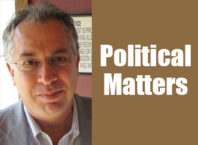By Mordecai Specktor
Cancelling Henry Sibley
As I mentioned in the December issue of The Circle, I attended Sibley High School. In gym class, we wore jerseys that were adorned with the image of an American Indian in a full-feather bonnet. The school nickname was Warriors and, in the late ’60s, it clearly referred to Native culture. Our yearbook was titled Keewaydin, a variant on Giiwedin, Ojibwe for “north wind” or “north.”
I was a member of the Class of 1968, and that fateful year of world revolution has reverberated through the decades. The 73-day U.S. government siege of the village of Wounded Knee, in 1973, was another turning point, as the American Indian Movement (AIM) and traditional Oglala Lakota at Pine Ridge took a stand against repression and tribal corruption.
On another track, Native people campaigned against the appropriation of their sacred symbols and rituals for America’s sports-industrial complex. On the prep and collegiate levels, numerous schools changed the names of sports teams known as the Indians, Braves, Fighting Sioux, etc.
In the professional ranks, it seemed like the team owners would hold fast to their nicknames and demeaning symbols derived from Native lifeways; but the year 2020 was another time for a sea change in consciousness – a rethinking wrought by the Minneapolis police killing of George Floyd, on May 25. As statues of Confederate generals were pulled from their pedestals (along with the Columbus statue at the Minnesota Capitol), a reconsideration of history and cultural touchstones was taking place.
Pro sports executives – even those in the hidebound NFL that shunned Colin Kaepernick for taking a knee in support of Black lives – were moved by the global reckoning on racial justice that was triggered by a cop crushing the life out of Big Floyd, by Cup Foods, Chicago Avenue and 38th Street, South Minneapolis. The Washington NFL franchise, which was facing pressure from its corporate sponsors, announced that it would ditch the “R”-word; its squad is now called the Washington Football Team.
And in mid-December, Major League Baseball’s Cleveland franchise announced that it will no longer be the Indians, as of the 2022 season. “We have decided to move forward with changing the current team name and determining a new, non-Native American based name for the franchise,” the club said in a statement reported in the New York Times.
Unlike the Washington NFL franchise, which lurched forward in response to financial pressure, the Cleveland club studied the issue in a deliberative way.
“One of the experts the team consulted over the summer was Stephanie Fryberg, a professor of psychology at the University of Michigan and a member of the Tulalip tribes in western Washington State,” according to a story in the Times. “Her research illustrates the damaging effects the use of Native American sports mascots have on Indigenous people, particularly children.”
Fryberg “presented her research, gave her opinions and answered their questions. She believes the team should be lauded for its open-minded and genuine approach to a sensitive matter.”
“It wasn’t at all like the Washington Football Team, which did it kicking and crying,” Fryberg told the newspaper. “It was a really thoughtful process, and it was obvious they cared about it. They listened and asked good questions. They said: ‘Look, many of our fans really like this name. Is there any way to make it work?’ But they understood there is no way to keep the name without doing harm.”
Of course, there’s still the matter of the Atlanta Braves and the Kansas City Chiefs, to cite two examples of pro franchises that still need a nudge to do the right and decent thing.
Getting back to my alma mater, on Dec. 7, the board of West St. Paul-Mendota Heights-Eagan Area Schools, aka School District 197, voted unanimously to change the name of Henry Sibley High School.
Minnesota’s first governor led U.S. troops in the 1862 war against the Dakota, and then convened the military commission that condemned 303 Dakota men to death. Pres. Abraham Lincoln later reduced the list of condemned men to 38; and they were hanged together on a scaffold on Dec. 26, 1862, in Mankato, Minn., in the largest mass execution in U.S. history.
In an Aug. 25, 1862 letter to Gov. Alexander Ramsey, who was then Minnesota’s second governor, Sibley betrayed his implacable enmity toward the Dakota: “My heart is steeled against them, and if I have the means, and can catch them, I will sweep them with the besom [a broom made of twigs tied around a stick] of death.”
The District 197 school board made the correct decision, finally. I’ll be a proud alumnus of a school not named after a villainous character in Minnesota history.





